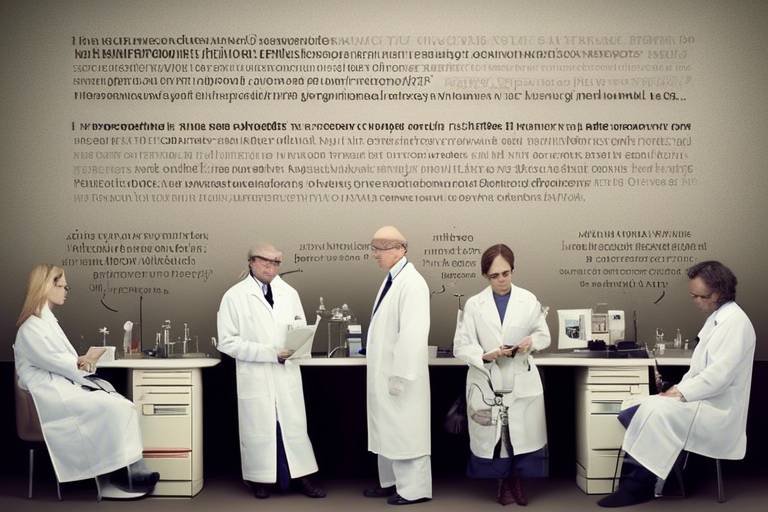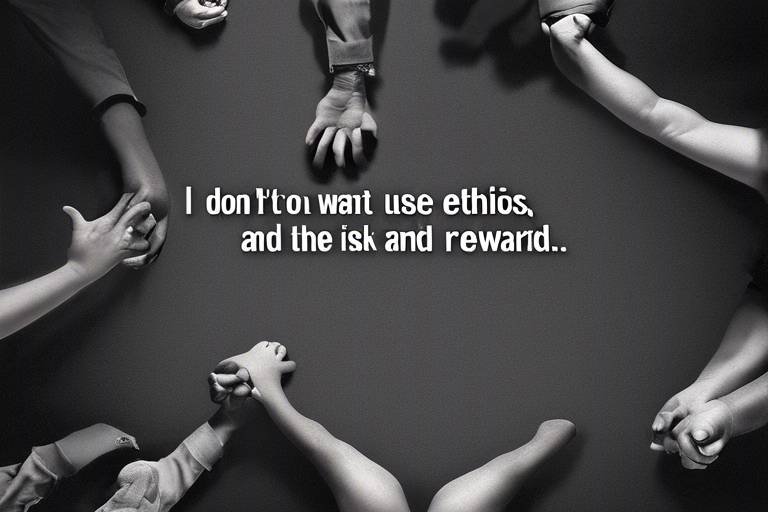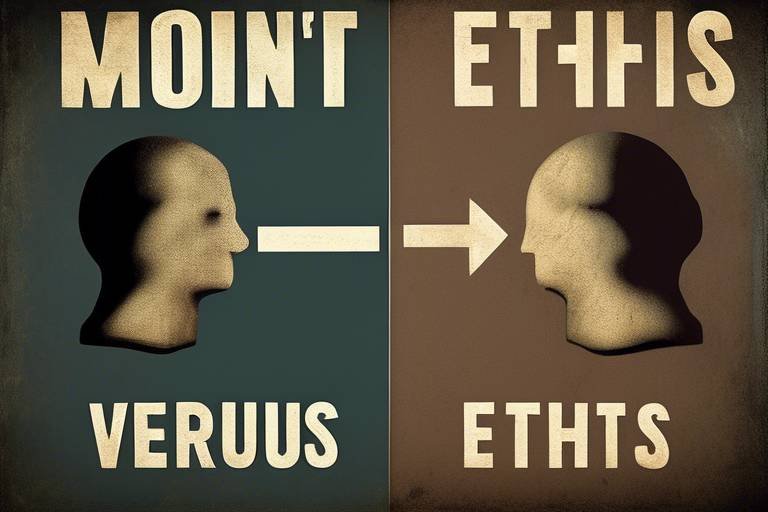The Ethics of Digital Detox - A Deeper Look
In our hyper-connected world, the concept of a digital detox has gained traction like wildfire. But what does it really mean, and why is it becoming a buzzword in discussions about mental health and well-being? A digital detox refers to the intentional reduction or complete withdrawal from digital devices—think smartphones, tablets, and laptops—for a specified period. This practice aims to allow individuals to reconnect with the real world, free from the constant barrage of notifications and digital distractions.
The origins of digital detox can be traced back to the early 2000s when the rise of social media and smartphones began to reshape our daily lives. As technology became more integrated into our routines, people started to notice a shift in their mental health. Anxiety levels soared, attention spans dwindled, and a general sense of disconnection from reality emerged. This led many to seek refuge in the idea of detoxing from their devices to reclaim their lives.
But here’s the kicker: while technology can enhance our lives, it can also be a double-edged sword. We live in an era where the line between our digital and physical lives is increasingly blurred. The relevance of digital detox in today's fast-paced world is not just a personal choice; it raises broader societal questions about our relationship with technology. Are we, as a society, becoming too dependent on our devices? Is there an ethical responsibility to disconnect, not just for ourselves but for the well-being of those around us?
As we delve deeper into the ethics of digital detox, we must consider the balance between embracing technology and recognizing its potential pitfalls. The psychological benefits of stepping back from screens are profound. Many individuals report enhanced mental clarity, reduced anxiety, and improved emotional well-being after engaging in a digital detox. It’s almost like taking a deep breath after being underwater for too long—suddenly, everything feels clearer and more manageable.
In the following sections, we will explore the intricate layers of this topic, from the psychological benefits to the social implications and the ethical considerations that come into play. Are we ready to take a hard look at our digital habits, or are we content to scroll endlessly through our feeds? The answers may surprise you.

Understanding Digital Detox
In our hyper-connected world, the term digital detox has become a buzzword that resonates with many. But what does it really mean? At its core, a digital detox refers to the intentional act of reducing or eliminating technology use, particularly smartphones, computers, and social media, to improve one’s mental health and overall well-being. This practice stems from the growing recognition of the adverse effects that excessive screen time can have on our minds and bodies. It’s like taking a much-needed breather from a chaotic, noisy party—stepping outside to find some peace and clarity.
The origins of digital detox can be traced back to the early 2000s when researchers and psychologists began to notice a troubling trend: as technology advanced, so did issues like anxiety, depression, and attention disorders. People started to realize that being constantly plugged in might not be as beneficial as they once thought. Imagine trying to read a book while someone is blasting music in the background; it’s virtually impossible to focus. Similarly, our brains struggle to process information effectively when inundated with notifications, emails, and social media updates.
Today, the relevance of digital detox has skyrocketed, especially in our fast-paced, always-on society. With the rise of remote work and digital communication, many find themselves glued to screens for hours on end. This can lead to feelings of burnout and disconnection from the real world. A digital detox encourages individuals to hit the pause button, allowing them to reconnect with themselves and their surroundings. It’s not just about turning off your phone; it’s about creating space for mindfulness, presence, and genuine human interaction.
Moreover, the benefits of a digital detox extend beyond personal wellness. It can foster deeper connections with family and friends, as time spent away from screens opens up opportunities for meaningful conversations and shared experiences. When we put down our devices, we can engage in activities that enrich our lives—like hiking, reading, or simply enjoying a meal with loved ones. This shift from virtual to real-world interactions can be transformative, reminding us of the beauty and simplicity of life outside our screens.
As we delve deeper into the implications of digital detox, it's essential to consider not just the personal benefits but also the broader societal impact. How does our relationship with technology shape our communities? And what ethical responsibilities do we have to ourselves and others when choosing to disconnect? These questions will guide our exploration of the digital detox phenomenon, helping us strike a balance between technology use and mental well-being.

The Psychological Benefits
Engaging in a digital detox can lead to significant psychological benefits that many people are unaware of. In our hyper-connected world, where notifications buzz incessantly and social media beckons for our attention, taking a break from technology can feel like a radical act. However, the rewards are profound. By intentionally reducing screen time, individuals often find themselves experiencing a newfound sense of clarity and calmness. Imagine stepping out of a noisy, crowded room into a serene garden; that’s what a digital detox can feel like for your mind.
One of the most immediate benefits is the reduction of anxiety. Constant exposure to digital stimuli can lead to feelings of overwhelm and stress. When you unplug, you're not just disconnecting from your devices; you're also giving your mind the space to breathe. Studies have shown that people who take regular breaks from screens report feeling less anxious and more in control of their lives. This is particularly important in a society where the pressure to be constantly available can feel suffocating.
Furthermore, a digital detox can enhance your overall emotional well-being. When you step back from the digital world, you create the opportunity to engage in real-life interactions and activities that bring genuine joy. Whether it’s connecting with friends over coffee, exploring nature, or diving into a good book, these experiences can significantly boost your mood and self-esteem. Research indicates that individuals who prioritize face-to-face interactions tend to report higher levels of happiness and fulfillment in their lives.
A digital detox doesn't just benefit your mental health; it also enhances your focus and productivity. When you disconnect from the barrage of notifications and digital distractions, you create an environment that fosters concentration. Imagine trying to read a book while someone is constantly talking in the background—it’s nearly impossible to focus. By minimizing these distractions, you can dive deeper into your work, leading to a more productive and rewarding experience.
Implementing specific strategies during your digital detox can maximize focus and productivity. Here are a few practical tips:
- Set Clear Boundaries: Define specific times when you will check your devices and stick to them.
- Create a Distraction-Free Zone: Designate a workspace free from digital interruptions.
- Engage in Mindfulness Practices: Incorporate meditation or deep-breathing exercises to clear your mind before starting work.
The long-term effects of a digital detox on productivity can be astonishing. Regular breaks from technology not only help in improving focus but also lead to sustained enhancements in work performance and creativity. Just as athletes need rest days to perform at their best, our brains also require time away from screens to recharge. Those who embrace regular digital detoxes often find themselves more innovative, generating ideas that may have eluded them during periods of constant connectivity.
In summary, the psychological benefits of a digital detox are numerous and significant. From reducing anxiety to improving focus and enhancing interpersonal relationships, the act of disconnecting can profoundly impact our mental health and overall quality of life. So, why not give it a try? You might just discover a clearer, more vibrant version of yourself waiting on the other side.
Q: How long should a digital detox last?
A: It can vary based on personal preference. Some may choose a weekend, while others may opt for a week or longer. The key is to find a duration that feels manageable for you.
Q: What activities can I do during a digital detox?
A: Engage in activities you enjoy, such as reading, hiking, cooking, or spending time with family and friends. The goal is to reconnect with the world around you.
Q: Will I miss out on important updates during a digital detox?
A: While you may miss some updates, you can always catch up later. Prioritizing your mental health is essential, and most updates can wait.

Improved Focus and Productivity
In a world where notifications buzz incessantly, and social media beckons with the allure of constant engagement, the concept of a digital detox emerges as a beacon of hope for those seeking to reclaim their focus and productivity. Imagine trying to read a captivating book while a symphony of alerts plays in the background—it's nearly impossible, right? This is the reality many face daily, where technology often disrupts our concentration and scatters our thoughts. By intentionally stepping back from our devices, we can cultivate an environment that fosters deeper focus and enhances our ability to get things done.
When we disconnect from our screens, we create a mental space that allows our minds to breathe and refocus. Studies have shown that reducing screen time can lead to improved cognitive function and a clearer thought process. In fact, many individuals report feeling a sense of mental clarity after just a short period of digital detox, akin to wiping a foggy window clean. This clarity can significantly enhance productivity, as it enables us to tackle tasks with renewed energy and creativity.
Moreover, the distractions caused by digital devices can hinder our ability to enter a state of flow—a psychological state where we are fully immersed and engaged in our work. When we take a step back from our devices, we not only minimize interruptions but also allow ourselves to dive deeper into our tasks. This deeper engagement can lead to higher quality work and a greater sense of accomplishment.
To maximize the benefits of a digital detox, consider implementing a few strategies:
- Set Specific Tech-Free Times: Designate certain hours of the day to be completely tech-free. This could be during meals, family time, or even a few hours before bed.
- Create a Distraction-Free Workspace: Organize your workspace to minimize distractions. This can include removing unnecessary gadgets and keeping your phone out of reach.
- Engage in Mindful Breaks: Instead of scrolling through your phone during breaks, try activities like stretching, meditating, or taking a short walk. These practices can help refresh your mind and improve focus.
In addition to these strategies, the long-term benefits of a digital detox can be profound. By consistently taking breaks from technology, individuals often find that their productivity levels soar over time. It's like training for a marathon; the more you practice, the better you become. As you develop healthier habits around technology use, you may notice a marked increase in your work performance and creativity. This sustained improvement is not just beneficial for personal growth; it can also lead to enhanced collaboration and innovation in team environments.
In summary, embracing a digital detox is not merely about stepping away from screens; it’s about rediscovering our ability to focus and engage deeply with our work and lives. By intentionally disconnecting, we empower ourselves to be more productive and creative, ultimately leading to a more fulfilling and balanced life.

Strategies for Enhanced Focus
When it comes to achieving enhanced focus during a digital detox, the journey can feel a bit like navigating a maze. It’s easy to get lost in distractions, especially when our devices are constantly pulling us back into their digital embrace. However, with a few strategic approaches, you can carve out a path to clarity and concentration. First off, consider setting clear boundaries for your technology use. This might mean designating specific times of the day to check emails or social media, allowing you to fully engage in your tasks without the nagging urge to scroll or click.
Another effective strategy is to create a distraction-free environment. Think of your workspace as a sanctuary where focus reigns supreme. You can achieve this by decluttering your physical space and eliminating unnecessary digital notifications. For instance, turning off alerts for non-essential apps can significantly reduce interruptions. Additionally, using tools like website blockers can help you stay away from tempting sites that might derail your concentration.
Moreover, embracing the power of mindfulness can work wonders for your focus. Taking a few moments to practice deep breathing or meditation can clear your mind and prepare you to tackle tasks with renewed vigor. Even a short 5-minute mindfulness session can help reset your brain, making it easier to dive back into your work. Pairing this with techniques such as the Pomodoro Technique, where you work for 25 minutes followed by a 5-minute break, can enhance your productivity while keeping your mind fresh.
Lastly, remember that physical health plays a crucial role in mental clarity. Regular exercise, a balanced diet, and adequate sleep can significantly improve your ability to concentrate. So, don’t underestimate the impact of a brisk walk or a good night’s rest on your focus levels. By integrating these strategies into your digital detox, you not only enhance your concentration but also foster a healthier relationship with technology.
- What is a digital detox? A digital detox involves intentionally reducing technology use to improve mental health and well-being.
- How can I stay focused during a digital detox? Set clear boundaries for technology use, create a distraction-free environment, practice mindfulness, and maintain physical health.
- Are there any tools to help with digital detox? Yes, tools like website blockers and focus apps can assist in minimizing distractions during your detox period.
- How long should a digital detox last? The duration can vary based on individual needs; even a few hours to a few days can be beneficial.

Long-term Productivity Gains
The benefits of a digital detox extend far beyond the immediate relief from constant notifications and screen time. Engaging in regular breaks from technology can lead to remarkable that transform not just how we work, but how we engage with our lives. Imagine your mind as a well-tuned engine; if it's constantly bombarded with distractions, it can sputter and stall. However, by allowing it to cool down and recalibrate through periods of digital detox, you can unleash its full potential.
One of the most significant long-term effects of reducing technology use is the enhancement of creative thinking. When we step away from screens, we often find ourselves in a space where our minds can wander freely. This mental space is crucial for creativity, as it allows us to make connections between ideas that we might not have considered while glued to our devices. Studies have shown that individuals who regularly engage in digital detoxes report higher levels of creativity and innovation in their work. They tend to approach problems from different angles, leading to unique solutions and breakthroughs.
Moreover, a digital detox can foster improved time management skills. Without the constant pull of social media and email, individuals often find they can allocate their time more effectively. By prioritizing tasks and focusing on what truly matters, they can achieve more in less time. This not only enhances productivity but also contributes to a healthier work-life balance. After all, who doesn't want to finish their workday feeling accomplished and still have time to enjoy life?
In addition, there’s a noticeable improvement in decision-making abilities when individuals practice regular digital detoxes. When we’re constantly bombarded with information, it can lead to analysis paralysis, making it difficult to make even simple decisions. However, by stepping back from the digital noise, we can enhance our ability to evaluate options critically and make choices that align with our goals. This clarity can lead to more confident and effective decision-making both in personal and professional spheres.
To illustrate the impact of a digital detox on productivity, consider the following table that outlines key areas of improvement:
| Area of Improvement | Before Digital Detox | After Digital Detox |
|---|---|---|
| Focus | Frequent distractions, low concentration | Enhanced concentration, better task completion |
| Creativity | Limited idea generation | Increased innovative thinking |
| Time Management | Procrastination, inefficient task execution | Effective prioritization, timely completion |
| Decision-Making | Overwhelmed by choices | Clearer, more confident decisions |
In conclusion, the long-term productivity gains from a digital detox are profound. By prioritizing time away from screens, we not only enhance our immediate focus but also cultivate a sustainable approach to productivity that can benefit us for years to come. So, the next time you feel overwhelmed by the digital world, remember that stepping back might just be the key to unlocking your full potential.
- What is a digital detox? A digital detox is the intentional reduction of technology use to improve mental health and well-being.
- How often should I engage in a digital detox? It varies by individual, but many people find that regular breaks, such as weekly or monthly detox periods, can be beneficial.
- Can a digital detox improve my relationships? Yes! Taking breaks from technology can help you reconnect with friends and family on a deeper level.
- Is a digital detox suitable for everyone? While beneficial for many, it's essential to consider individual circumstances, especially for those who rely on technology for work or communication.

Social Implications
In our increasingly digital world, the concept of a digital detox does not merely affect individual users; it reverberates throughout our social fabric. As we become more reliant on technology for communication, entertainment, and even essential services, the decision to disconnect can raise profound questions about our relationships and community engagement. Have you ever considered how stepping away from your screens might alter your social interactions? It's a bit like taking a step back from a crowded party to appreciate the music and ambiance; sometimes, you just need a breather to see things clearly.
One of the most significant social implications of digital detox practices is their impact on interpersonal relationships. When we choose to unplug, we often find ourselves more present in our interactions with family and friends. Imagine sitting around a dinner table without the distraction of smartphones; conversations can flow more freely, and connections deepen. However, this can also lead to feelings of isolation for those who remain plugged in. The challenge lies in finding the right balance, as some individuals may feel left out or disconnected when others engage in detox practices.
Moreover, the shift towards digital detox can influence community engagement. In a world where social media often serves as a primary means of connection, stepping away from these platforms might lead to a decrease in community involvement. For instance, local events and initiatives are frequently promoted online, and by disconnecting, individuals may miss opportunities to participate in meaningful activities. This raises an important question: Are we sacrificing community engagement for personal well-being? It's a delicate dance between nurturing our mental health and remaining active participants in our communities.
To illustrate the potential effects of digital detox on social dynamics, consider the following table that outlines both the positive and negative impacts:
| Positive Impacts | Negative Impacts |
|---|---|
| Enhanced face-to-face interactions | Feelings of isolation for those who stay connected |
| Deeper emotional connections | Missed opportunities for community events |
| Improved communication quality | Potential misunderstandings with digitally engaged peers |
Ultimately, the social implications of digital detox are complex and multifaceted. While disconnecting can lead to richer, more meaningful relationships, it also poses challenges for maintaining connections in a digitally driven society. As we navigate this terrain, it's crucial to consider how our choices impact not only our well-being but also the well-being of those around us. Are we ready to embrace a more mindful approach to technology, or will we continue to let our devices dictate the terms of our social interactions?
In conclusion, the act of engaging in a digital detox can serve as a double-edged sword. It offers a pathway to improved mental health and deeper connections but also raises questions about our roles in our communities and relationships. Finding that sweet spot between technology use and personal interaction is essential for fostering a healthy social environment.
- What is a digital detox? A digital detox is the intentional reduction of technology use to improve mental health and well-being.
- How can a digital detox improve my relationships? By reducing distractions, you can engage more fully with those around you, leading to deeper connections.
- Are there any downsides to a digital detox? Yes, individuals may feel isolated or miss out on community events that are primarily shared online.
- How long should a digital detox last? The duration can vary; even short breaks can be beneficial, but longer periods may lead to more significant changes.

Ethical Considerations
The conversation surrounding digital detox practices is not just about personal well-being; it also delves into the realm of ethics. As we navigate our increasingly digitized world, the choices we make regarding technology usage carry weighty implications. The ethics of stepping back from our screens involves a complex interplay of personal responsibility and social impact, prompting us to reflect on our roles within a community that thrives on constant connectivity.
At the core of this discussion is the idea of personal responsibility. Each individual holds a degree of accountability for their technology habits. While it’s easy to point fingers at the devices that consume our attention, the truth is that we have the power to regulate our usage. This self-regulation is not merely a personal choice; it’s an ethical duty. By consciously deciding to disconnect, we not only enhance our mental health but also set an example for others. It's a ripple effect—when one person chooses to unplug, it encourages those around them to consider their own habits.
However, the ethical implications extend beyond individual choices. The impact of digital detox practices can disproportionately affect vulnerable populations. For many, technology is not just a luxury; it is a lifeline. Consider those who rely on digital tools for essential services such as healthcare, education, and employment. When we advocate for a digital detox, we must also be mindful of how these practices can create barriers for those who cannot afford to disconnect. The challenge lies in finding a balance that promotes mental well-being while ensuring that no one is left behind.
To illustrate this point, let’s examine some of the groups that may be affected by the push for digital detox:
| Group | Potential Impact of Digital Detox |
|---|---|
| Students | May miss out on online learning resources and social connections. |
| Low-Income Families | Limited access to essential services that are increasingly online. |
| Healthcare Patients | Difficulty in accessing telehealth services or medical information. |
This table highlights the necessity of considering who benefits from a digital detox and who might be left in the lurch. As we promote healthier tech habits, it’s crucial to advocate for inclusive solutions that cater to everyone, ensuring that digital detox does not become a privilege for the few.
Moreover, the societal impact of our collective digital habits cannot be overlooked. The act of disconnecting can foster deeper connections within our communities. When we choose to engage in face-to-face interactions rather than scrolling through social media, we strengthen our bonds with those around us. Yet, this raises questions about how we can promote a culture of disconnection without alienating those who find community online. Striking this balance is essential in fostering a society that values both digital engagement and personal interaction.
In conclusion, the ethics of digital detox practices are multifaceted, involving a careful consideration of personal responsibility, the needs of vulnerable populations, and the broader impact on society. As we navigate this complex landscape, it is vital to engage in open discussions about our choices and their implications. By doing so, we can cultivate a more responsible and inclusive approach to technology use, ensuring that everyone has the opportunity to benefit from a healthier digital lifestyle.
- What is a digital detox? A digital detox involves intentionally reducing technology use to improve mental health and overall well-being.
- How can I start a digital detox? Begin by setting specific times to unplug, reducing screen time gradually, and engaging in offline activities.
- Are there any risks associated with digital detox? Yes, it can be challenging for those who rely on technology for essential services, so it's important to find a balance.
- How does digital detox impact productivity? Reducing distractions from technology can lead to improved focus and productivity over time.

Personal Responsibility
In our hyper-connected world, has become a crucial concept, especially when discussing the practice of digital detox. It’s easy to point fingers at technology and blame it for our stress and anxiety, but the truth is, we have the power to control our relationship with it. Just like a gardener tends to their plants, we must nurture our digital habits to ensure they contribute positively to our lives rather than detract from our well-being.
When we engage in a digital detox, we are not merely stepping away from our devices; we are taking a stand for our mental health. This act of disconnecting is a declaration of our intention to prioritize self-care over the incessant pull of notifications and social media updates. It’s about recognizing that while technology can enhance our lives, it can also overwhelm us if we allow it to dominate our time and attention.
Moreover, personal responsibility extends beyond just individual choices. It involves being mindful of how our technology use affects those around us. For instance, consider how often we are physically present with friends or family yet mentally absent due to our phones. This disconnect can lead to strained relationships, as we may prioritize our digital interactions over real-life connections. Thus, embracing personal responsibility means committing to being present, whether that’s during a family dinner or a casual chat with a friend.
As we navigate our digital landscape, it’s essential to establish boundaries that promote healthier interactions with technology. Here are a few strategies to consider:
- Set specific times for checking emails and social media.
- Designate tech-free zones in your home, such as the dining room or bedroom.
- Engage in activities that don’t involve screens, like reading or outdoor sports.
By implementing these strategies, we can cultivate a more balanced relationship with technology, one that respects our need for both connection and solitude. This balance is not just a personal journey; it’s a collective responsibility. As we advocate for healthier digital habits, we also encourage others to reflect on their technology use and its impact on their lives.
Ultimately, taking personal responsibility for our technology use is about more than just stepping back from our screens. It’s about fostering a culture of mindfulness and intentionality in our digital interactions. By doing so, we not only improve our mental well-being but also enhance the quality of our relationships and community engagement.
- What is a digital detox? A digital detox involves intentionally reducing technology use to improve mental health and well-being.
- How can I start a digital detox? Begin by setting specific times for device use and creating tech-free zones in your home.
- What are the benefits of a digital detox? Benefits include reduced anxiety, improved focus, and enhanced interpersonal relationships.
- Can a digital detox impact my productivity? Yes, disconnecting from digital distractions can lead to increased focus and productivity.
- Is digital detox suitable for everyone? While beneficial, accessibility and reliance on technology for essential services must be considered, especially for vulnerable populations.

Impact on Vulnerable Populations
The concept of digital detox, while beneficial for many, raises significant ethical concerns, particularly regarding its impact on vulnerable populations. These groups often include low-income individuals, the elderly, and those with disabilities who may rely heavily on technology for communication, access to services, and social interaction. For them, the idea of disconnecting can be not just challenging but also detrimental. Imagine a senior citizen who uses video calls to stay connected with family or a low-income individual who relies on online platforms for job applications and essential services. For these individuals, a digital detox can feel like being cut off from lifelines that are critical to their well-being.
Moreover, the digital divide plays a crucial role in this discussion. While some can afford to take breaks from technology, others may not have the luxury to disconnect, as they are dependent on digital platforms for daily survival. This creates a disparity that must be acknowledged. The ethical implications are profound: is it fair to advocate for digital detox when it could inadvertently alienate those who cannot afford to step away from their screens? This question highlights the need for a more inclusive approach to technology use, one that considers the varying levels of access and dependency across different demographics.
Additionally, the societal pressure to engage in a digital detox can lead to feelings of inadequacy among those who cannot participate. The stigma surrounding excessive technology use can marginalize individuals who rely on digital tools for their livelihoods or social connections. It's essential to foster an environment where technology use is understood within the context of personal circumstances. To address these disparities, we must consider the following:
- Accessibility: Ensuring that all populations have access to technology and the skills to use it effectively.
- Support Systems: Creating community support for those who may struggle with digital literacy or access to technology.
- Awareness Campaigns: Promoting understanding of the diverse needs and challenges faced by vulnerable populations in discussions about digital detox.
In conclusion, while the benefits of a digital detox are clear for many, the ethical considerations surrounding vulnerable populations cannot be overlooked. It is crucial to approach the topic with sensitivity and a commitment to inclusivity, ensuring that everyone has the opportunity to engage with technology in a way that supports their well-being rather than detracts from it.
- What is a digital detox? A digital detox is a period during which a person refrains from using digital devices to improve their mental health and well-being.
- Who can benefit from a digital detox? Anyone can benefit, especially those feeling overwhelmed or stressed by constant connectivity.
- Are there any risks associated with digital detox? Yes, especially for vulnerable populations who rely on technology for essential services and communication.
- How can I start a digital detox? Begin by setting specific times to unplug and gradually increase those periods.
Frequently Asked Questions
- What is a digital detox?
A digital detox is the intentional act of reducing or eliminating technology use, particularly digital devices, to improve mental health and overall well-being. It's like taking a vacation from screens to reconnect with the real world.
- Why should I consider a digital detox?
Engaging in a digital detox can offer numerous benefits, such as reduced anxiety, improved focus, and enhanced emotional well-being. Imagine clearing the fog in your mind; that's what stepping away from screens can do!
- How can a digital detox improve my productivity?
By disconnecting from digital distractions, you can enhance your concentration and create a more productive work environment. Think of it as decluttering your workspace; a clear mind leads to clearer thoughts and better output!
- What strategies can I use during a digital detox?
Some effective strategies include setting specific times for technology use, engaging in offline activities like reading or exercising, and creating tech-free zones in your home. These steps can help you reclaim your time and focus!
- Are there any social implications of a digital detox?
Yes, digital detox practices can influence interpersonal relationships and community engagement. When you disconnect, you might find more time to connect with those around you, strengthening your bonds and building a sense of community.
- What ethical considerations should I be aware of?
It's essential to consider personal responsibility in managing technology use and the impact on vulnerable populations. Not everyone has the luxury to disconnect, so it's crucial to approach digital detox with empathy and awareness.
- How often should I do a digital detox?
The frequency of a digital detox can vary from person to person. Some may benefit from short, regular breaks, while others might prefer longer, more intentional detox periods. Listen to your mind and body to find what works best for you!



















